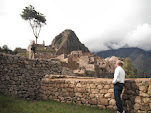Greetings! In the coming weeks, the posts will be related to world religions. Karl Marx and Sigmund Freud both had great concerns about religion being used as a tool to manipulate people. This first post provides fodder for the concerns of the philosopher and psychoanalyst. Ptolemy I Soter, one of Alexander the Great's generals, played a crucial role in the formation of the Hellenistic Kingdom of Egypt after Alexander’s death. A significant aspect of Ptolemy I's reign was his creation of the deity Serapis, a unique and syncretic god that symbolized the fusion of Greek and Egyptian religious beliefs. The story of Ptolemy I creating Serapis is a testament to the strategic and cultural adaptability of the Ptolemaic dynasty in Egypt.
Ptolemy I recognized the importance of uniting the diverse
population of Egypt, which included both Greeks and Egyptians, to ensure the
stability and prosperity of his kingdom. To achieve this, he embarked on a
project to create a deity that could bridge the gap between the two cultures.
Serapis was conceived as a composite deity, drawing from elements of both Greek
and Egyptian pantheons. He combined the Greek god Zeus and the Egyptian god
Apis, resulting in a deity with a distinct, multicultural identity.
The creation of Serapis served as a unifying force in
Ptolemaic Egypt, as it allowed people from different cultural backgrounds to
find common ground in their religious beliefs. Serapis was depicted with Greek
and Egyptian attributes, such as a Greek-style beard and Egyptian headdress,
which further emphasized the blending of these two traditions. The Serapeum, a
temple dedicated to Serapis in Alexandria, became a central hub for this new
deity's worship, attracting devotees from various backgrounds.
Ptolemy I's creation of Serapis not only demonstrated his
political acumen in maintaining stability in his multicultural kingdom but also
reflected the adaptability and open-mindedness of the Hellenistic world.
Serapis continued to be revered not only in Egypt but also in various parts of
the Mediterranean world, even extending into the Roman Empire. The story of
Ptolemy I's creation of Serapis remains a testament to the power of religion in
shaping the cultural and social dynamics of the ancient world, as well as the
enduring legacy of Ptolemaic Egypt's cultural fusion.
All the best,
Tom


No comments:
Post a Comment